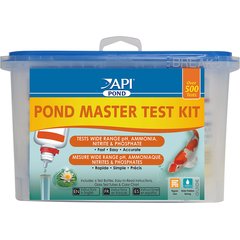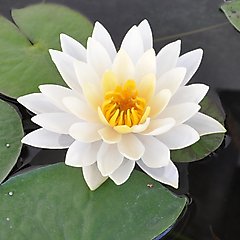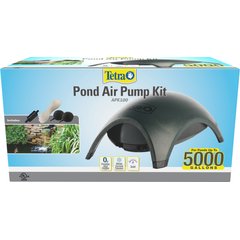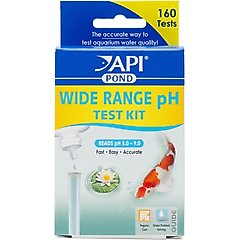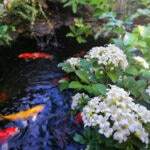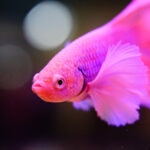Understanding Hot Weather Issues in Fish Ponds
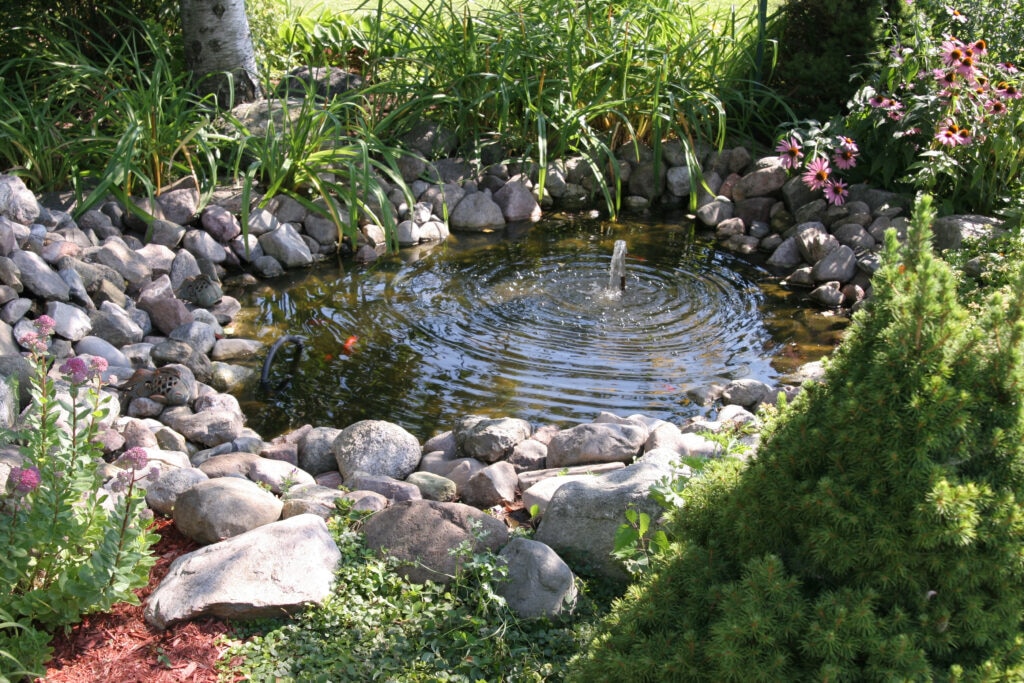
Photo by Bouillante/E+ via Getty Images Plus
When the weather heats up, so does your backyard pond—and your fish feel it. Hot days can lower the oxygen levels in the water, cause algae blooms, and make it harder for your fish to stay healthy. But with a few steps and good planning, you can keep your pond cooler, even in the summer heat.
Key Takeaways
- Fish suffering from heat stress may gulp air at the surface or spend more time near aerators and water features.
- Deeper ponds allow the fish to dive down for a cooler water temperature.
- Fish ponds with fountains or waterfalls can keep the water moving and cooling off.
- Installing shade cloths above the pond takes the edge off the summer sun.
How Does a Hot Day Affect Fish Ponds?
A rise in temperature can cause a host of issues in your fish pond, including:
Oxygen Depletion
If you notice your fish gasping or gulping for air near the surface or around aerators and other moving water features, you may have a temperature problem.
Warm water doesn’t hold as much dissolved oxygen as cooler water, so your fish can suffocate if it goes on long enough.
Algae Blooms
Warm days and cool nights are prime conditions for algae growth. Algae doesn’t photosynthesize at night, and can compete with fish for oxygen at this time.
“High temperatures can lead to poor water quality, especially when combined in a pond with excess nutrients and waste. Warm water can speed up decomposition and can boost algae growth,” says Matt Hayes of Fish Shop Matt in Congresbury, England. “Strong circulation prevents stagnation and supports the breakdown of waste products, reducing the fuel for algae blooms.”
Stress on Aquatic Life
Temperature fluctuations stress fish and cause cortisol levels to increase, says Todd Cecil, DVM, DABVP (Fish, Avian). This weakens their immune system, increasing the risk of infections, illness, and in severe cases, even death.
Poor Water Quality
Warm weather makes water evaporate more quickly. However, the waste and other organic material in your pond stays behind, leading to a concentration of harmful compounds and poor water quality.
If you find that your pond is warmer than usual, test the water with a kit like the API Pond Master Test Kit to check all water parameters.
Recommended Product
Signs of Temperature Stress in a Pond
If you know a heat wave is coming, you can take proactive steps to protect your fish. But when temperatures rise unexpectedly—or more intensely than forecast— it’s important to watch for warning signs of temperature stress, including:
- Fish gasping at the surface or lethargy
- Fish congregating around water features and aeration devices
- Sudden fish deaths
- Excessive algae or murky water
- Unpleasant odors
- Fish staying in the bottom of the pond
How To Help Prevent a Pond from Overheating
Depending on your pond’s location and design, you can do several things to help keep your pond from overheating and hurting your fish.
Improve Pond Design
“If you have koi fish and it’s a hot day, they’re coming to the surface to try to get more oxygen by hanging out near the waterfall,” says Dr. Cecil.
Consider installing shade cloth to lower the impact of direct sun and help reduce the pond temperature. Floating plants and other aquatic plants like irises, grasses, and water lilies can also provide shade. Keep in mind that if you have a lot of submerged plants, they also consume oxygen at night, so balance is key.
Recommended Product
If you’re designing your pond from scratch, plan for deeper areas of water, which stay cooler, Hayes says.
“Improving your pond’s design is one of the best long-term solutions for a pond that suffers with overheating,” Hayes says.
Aeration and Circulation
“Water circulation plays a huge role in keeping your pond cool. A well-designed system with fountains, waterfalls, or aerators like the Tetra Pond Air Pump Kit will help circulate the pond water and prevent heat buildup at the surface. More importantly, it helps maintain oxygen levels throughout the pond,” Hayes explains.
Recommended Product
Water Quality Management
Performing regular water tests, including temperature, oxygen, pH, and nutrients, will help you stay on top of things, so when there is a problem it’s more easily corrected. You’ll need a test kit or test strips.
Recommended Product
Controlling runoff is also important to the overall water quality in your pond. If it is downhill from your lawn, consider installing barriers to divert water away from the pond. That’s because fertilizer from runoff can be especially harmful to water quality.
Additionally, plant grasses and other shore-based plants can help reduce erosion.
Evaporation Reduction
Reducing evaporation helps keep your pond water balanced.
You can reduce evaporation with floating aquatic plants that help increase the shade and reduce evaporation by blocking the sun’s rays.
It’s also important to maintain the water level, because higher temperatures mean more evaporation.
What To Do If Your Pond Is Too Hot
“When your pond gets dangerously hot, it’s important to act quickly,” Hayes explains. “Start by adding temporary shade and increase water flow and aeration if possible.”
Here is your quick action plan to help cool your pond, balance the water, and keep your fish healthy:
- Immediately increase water flow and aeration. This will help keep cool the water and introduce more oxygen.
- Install shades, umbrellas, or other covers to reduce the sun’s impact.
- Change some of the water, using dechlorinated water.
- Add ice blocks, which will thaw slowly enough to reduce the temperature safely.
- Add plants. Your pond shouldn’t be full of plants, but about 40–60% of the area can have plants to help increase oxygen, absorb excess nutrients, filter the water, and provide shade.
Helping your fish pond weather the summer heat doesn’t have to be complicated. By taking a few well-planned steps like adding shade and keeping an eye on water quality, your fish will stay healthy during the next heat wave.
Remember to watch for signs of stress and act quickly if the water starts to heat up. With the right care and attention, your pond can be a healthy, relaxing space all summer long.
